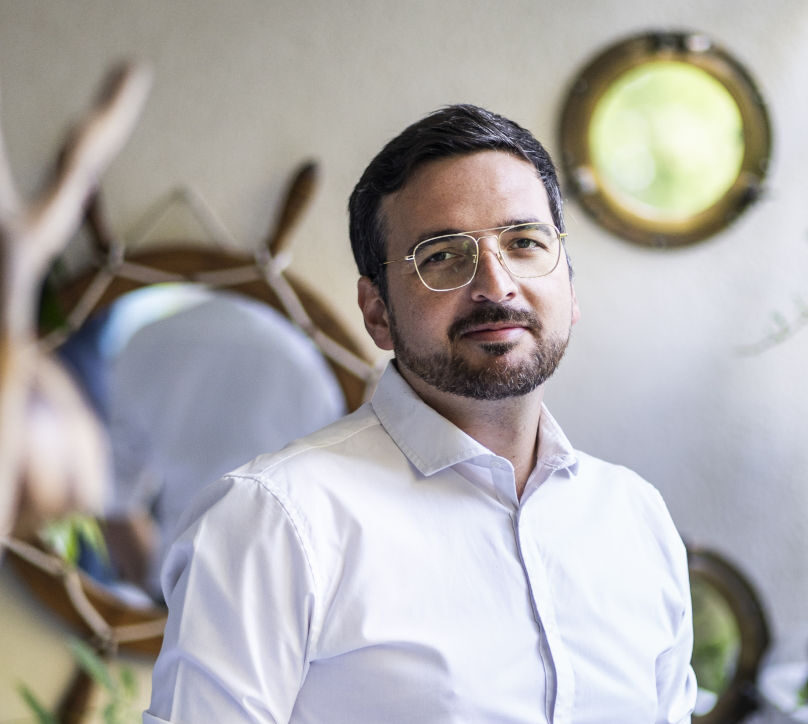Mircea Sofonea, the model epidemiologist
Mircea Sofonea is an epidemiologist at the Pathogenesis and Control of Chronic and Emerging Infections (PCCEI) laboratory. Although his field has only become widely known since the Covid epidemic, for him it has been a lifelong vocation. Portrait of a researcher who knows how to stay the course.

Epidemiology? Much more than a scientific discipline, it is a bridge between generations for Mircea Sofonea. With two parents who are mathematicians and grandparents in the health field, no other career could have brought together his family's trajectories so well. And for good reason: epidemiology lies at the interface between the formal sciences and health."Throughout my childhood, I heard talk of viruses and antibiotic resistance," recalls Mircea Sofonea, who showed a strong interest in microbiology from middle school onwards and already had a clear career choice: he would be a researcher. "But I was still hesitating between medical biology and population genetics, which is more mathematical. " While his heart was torn between the two, a third path would soon emerge.
"I quickly realized that in order to study microbes from every angle, you also need to be trained in chemistry, physics, computer science, and so on," recalls the researcher. He therefore opted for a course that combined all these disciplines: a BCPST preparatory course (biology, chemistry, physics, and earth sciences), which took him from his hometown of Perpignan to Paris and the Lycée Henri IV. After passing the entrance exam, Mircea Sofonea enrolled at the École Normale Supérieure in 2010, where he chose the biology department and also took courses in mathematics and, at the Pasteur Institute, epidemiology and infectious disease modeling. This experience put an end to his indecision: he would become an epidemiologist.
Facing Ebola
After graduating from ENS, he headed back south and settled in Montpellier in 2014 to work on his thesis at the Mivegec laboratory, entitled "Evolution of virulence and multiple infections." It was a particularly significant moment, as Africa was then facing the largest Ebola epidemic in history. "It was the first time that an epidemic had been analyzed in real time to such an extent. For epidemiologists, it foreshadowed the work that would be carried out a few years later with Covid..."
But for now, what will become a global event still resembles the plot of Contagion, his favorite science fiction film, and Mircea Sofonea defends his thesis in 2017, blissfully unaware of what awaits him two and a half years later. Yet time passes very quickly, as does his career progression: in May 2018, at only 27 years old, the researcher landed a highly coveted position as a lecturer at the Mivegec laboratory. He humbly describes this success as "a stroke of luck" or "the planets aligning," but it also owes much to his extraordinary determination. "I carved out my own path by developing skills in several areas."
Mircea Sofonea spent his first year putting these skills to use in teaching, an activity that he has always considered "essential for bringing research out of the microcosm of experts." On this subject, he quotes philosopher Patrick Tort, wholikens"a scientist who only addresses his peers to a postman who only delivers mail to postal workers." Mircea Sofonea had already adopted this maxim a few years earlier when he sat the CAPES mathematics exam and the agrégation biology exam as an independent candidate, "to be sure he could teach."
"We can't just sit back and do nothing."
At the dawn of his second yearProfessor, with his classes well established, Mircea Sofonea was preparing to devote himself to his research. Autumn 2019 passed, "and on December 31, 2019, we heard about cases of atypical pneumonia in China. I remember wondering what the right criteria were for knowing early on whether or not things would get out of hand." Things did get out of hand, and quickly, with the lockdown imposed in March 2020.
"Even before lockdown, in the team then led by Samuel Alizon, we had decided that we couldn't just sit back and do nothing. I remember one particular anecdote that was decisive: a methodological error in calculating the proportion of people who would be infected was published in The Lancet and repeated a few days later by Angela Merkel. We then decided as a team to use our Covid website to share our research and also to educate people about epidemiology."
This marked the beginning of a period of intense activity for Mircea Sofonea, who became a media reference: he gave 1,300 interviews in five years and contributed to several national reports on the crisis. The researcher continues to build on this experience today by teaching epidemiology courses at the Association of Science Journalists. He regrets that education was not used more effectively during the pandemic, as "it makes people less susceptible to misinformation and more receptive to protective measures."
Preparing for the storm
While this global crisis has brought the researcher to the forefront, it has also given his work a new direction. Since 2023, Mircea Sofonea has added another string to his bow: he joined the anesthesia, intensive care, pain management, and emergency department at Nîmes University Hospital to help "prepare the hospital system as best as possible for future health crises, with a set of specifications called hygiocrisology."
Anticipation is also the common thread running through his latest project, entitled PReViX ( Pandemic Preparedness for Respiratory Virus X), which has just been awarded €1.4 million in funding from the PEPR MIE (Priority Research Program and Equipment – Emerging Infectious Diseases). "The project echoes a concept introduced by the WHO in 2018 in its list of priority pathogens, which includes Disease X, caused by an unknown pathogen capable of causing a serious international epidemic," explains the epidemiologist.
It is this new virus that the epidemiologist and his colleagues will attempt to profile. "We will never be able to prevent the emergence of new pathogens, but we can try to ensure that they do not cause the kind of chaos we have seen with COVID," explains Mircea Sofonea.
This project, which will begin in the fall of 2025 and last for three years, is positioned at the intersection of many disciplines: public health, virology, infectious diseases, genomics, and more, but also the humanities, with contributions from health psychologists. "If we collectively define the metrics, thresholds, and countermeasures that are desirable in calm times, we can then respond more rationally and optimally when the storm hits,"concludes Mircea Sofonea.
